Filipino senior peer counselors listen with their hearts
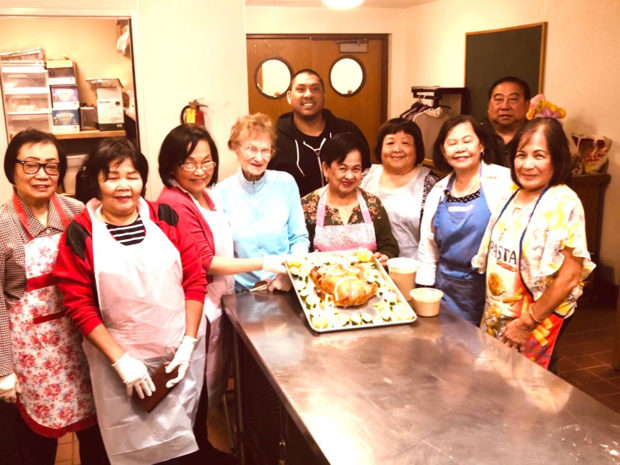
Seniors at Kapihan get-together in Daly City, California try new recipes. CONTRIBUTED
DALY CITY, California — Every Wednesday, Belmont resident Tessie Mamaril-Madrinan takes her baby blue sedan over to Interstate 101 for her weekly date with contemporaries in Daly City. The trek racks up over 20 miles each way, which suits Madrinan just fine. The midmorning drive allows her to relax before facilitating the two-hour get-together with the group that calls itself “Kapihan.”
Sometimes they’re 20, sometimes fewer than 10 gather at the Sunflower room reserved for them at Lincoln Community Center north of Top of the Hill in Daly City. Attendees come at their leisure and convenience. Most live within a few blocks or a number of bus stops away; some actually commute from another zip code to participate in the informal but deliberate exercise to socialize with folks of the same generation.
“Kapihan” of course, is Tagalog for coffee break, a brief respite from the work day for folks on the 8-hour career grind.
Madrinan’s “kapihan” is a different brew.
The activity is among the Older Adult Services of Peninsula Family Service, a nonprofit based in San Mateo County that since 1950 has been helping families in three counties through various stages in life.
Senior Peer Counseling is the keystone of the agency’s services for people 55 years and older. Aimed at “helping people stay connected to their community, their neighbors and their passion for life,” the program comprises Chinese, English, Spanish and LGBTQ services. Madrinan coordinates Filipino services.
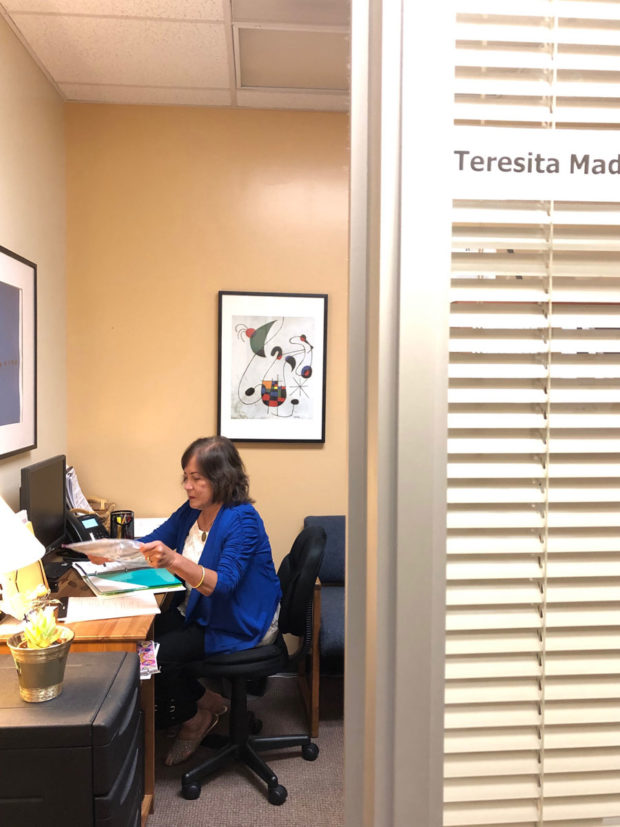
Tessie Mamaril- Madrinan coordinates the Filipino Peer Counseling program at Peninsula Family Service, a private nonprofit serving 3 counties in the San Francisco Bay Area. Photo by CHERIE M. QUEROL MORENO
“Through our programs, we reduce rates of illness and injury, maintain mobility, promote independence, and ensure aging members of our community live better, together,” Madrinan recites program outcomes. “We train volunteer counselors who make weekly home-visits. Through our diverse services, we’re able to personalize support and develop an individualized approach to help each older adult in our community thrive.”
Kapihan is the group component to liberate post-career individuals from isolation. Though initiated as culturally Filipino-specific, the program welcomes anyone who walks in and wishes to stay and participate.
Regulars come to meet new friends, perhaps friends of friends from the old country. They appreciate the monthly life coaching by celebrated marriage and family therapist Paulita Lasola Malay.
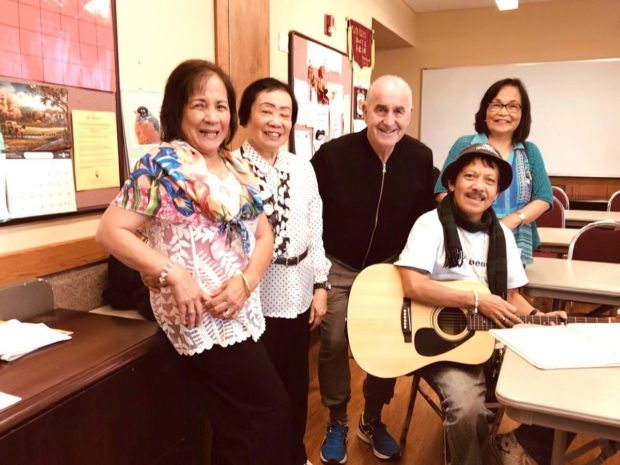
Seniors sing along to classics and Original Pilipino Music Filipino and learn life skills together at Lincoln Community Center. CONTRIBUTED
Music is big on the curriculum, with a guitarist leading an unplugged version of karaoke. Nutrition is scheduled every third Wednesday, when some participants get to show off their cooking chops and others reveal their hearty appetites. At no cost.
The idea is to connect and share, says the Manila-born Madrinan, who marked her first anniversary as Filipino Peer Counseling Coordinator in July. It’s a part-time job, but her service to the agency goes back to 2009, when she signed up to volunteer as a peer counselor.
For 20 years, she had worked at The Gap, first as computer programmer and then as project leader and IT audit manager before taking a break from employment. She decided to focus on her advocacy to “give back for the abundant blessings” she has received, she told this writer.
It’s not as if the former accountant and IT systems analyst with Manila’s pioneer professional consultancy Sycip, Gorres Velayo & Co. had nothing better to do. For 23 years, she has held leadership positions with the Legion of Mary of St. Mark’s Catholic Church in Belmont, where she has served on the parish council under three pastors. She chaired the membership committee of the Redwood Shores Lions Club. On top of being wife to Anselmo Madrinan Jr., controller of Sports House in Redwood City, and mother to their sons, Mark and Paul.
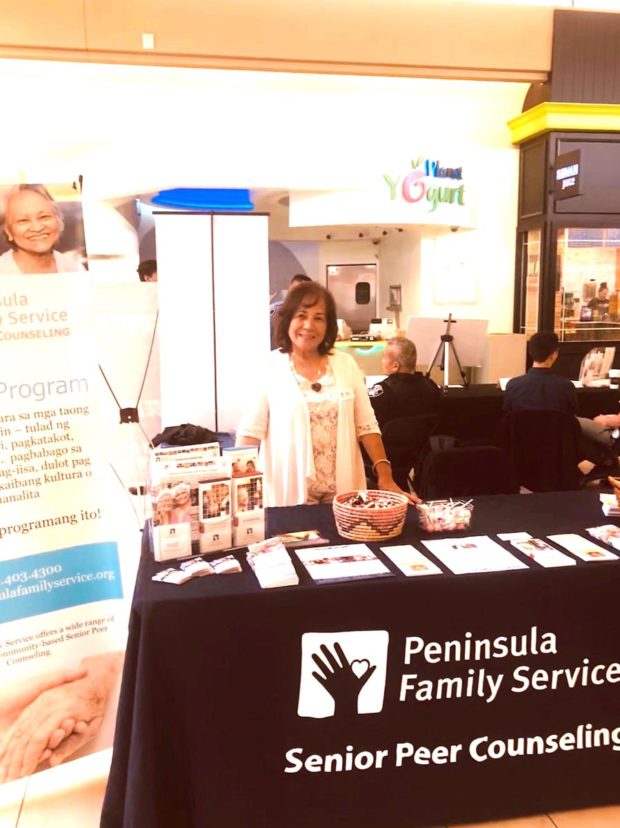
Former IT systems analyst in Manila and California, Tessie Madrinan attends health fairs to reach out to older adults looking to volunteer or to participate in activities. CONTRIBUTED.
With the children grown and pursuing their professions, and the encouragement of her husband, Madrinan chose the earlier iteration of Peninsula Family Service as object of her altruism.
To become a volunteer senior peer counselor, she completed the 35-hour training required to provide emotional support and understanding one hour a week to older adults facing challenges such as “loneliness, depression, grief, isolation, loss and life changes.”
Peer counselors learn communication skills, counseling basics, cultural sensitivity, understanding of social isolation, responding to depression and anxiety, common health issues of older adults and self-care.
Fully trained, they undergo supervision by Ann Blick Hamer, a licensed clinical social worker and program manager of Senior Peer Counseling.
Someone with a desire to help older adults, is caring and compassionate, and listens with the heart would be an ideal candidate. They need to commit to volunteer at least one hour a week for one year. And be close to the age as potential clients.
Madrinan was the perfect fit.
She is soft-spoken with a voice made for radio — comforting, easy to hear. But it is she who is gifted with empathetic listening, the ability to pay complete attention without judgment or interruption, validating the speaker’s sentiments and reflecting back what she hears them say. The skill is valuable in her own life.
“I’ve learned so much from my clients’ life experiences,” she noted a perk of her work. “Being able to help them process their situations helps me figure out my own issues.”
Last summer the post of coordinator for the Filipino Peer Counseling program opened up when its founder Ofie Carpio-Albrecht opted for retirement. Madrinan was the ideal successor.
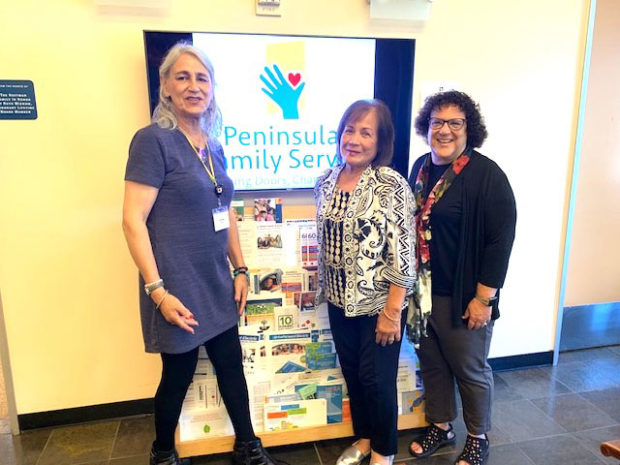
Madrinan with fellow Peer Counseling coordinators Victoria Valencia (left) and Michele Epstein. CONTRIBUTED
To date, the program has recruited 40 volunteers from the Tagalog-speaking community. Madrinan hopes to boost her squad with new counselors after the free training that starts Oct. 16 and ends Nov. 9.
“We are looking for San Mateo County residents at least 55 years old,” she stressed the object of her search in an area where Filipinos make up 70,191 or almost 10 percent of the population.
Luckily, individuals are living longer throughout the United States and specifically in San Mateo County, where up to 47,865 of all residents are at least 55 years old, according to the 2010 US Census updates.
Age, of course, is just a number. Most important are the qualities fundamental to counseling and availability. “If they can also commit to at least one hour a week and are willing to attend monthly group supervision, they would invaluable to our program,” stressed Madrinan.

